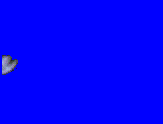
![]()
By Laura Rosen
February 1997
The Iranian
Yes, I am Iranian.
I am one of the forgotten ones. I represent the small, yet growing percentage of Iranians raised in the U.S. I am one of those indistinguishable statistics. You know the group. You could be a half breed or a full breed, or just have a little Persian blood.
Some of us speak Farsi with an American accent. Some of us don't. Some of us don't speak Farsi. Some of us have never heard of the word, "Farsi." Some us have childhood memories of Iran. Some of us were infants when we left the country. Some of us can't find Iran on the map.
My brother was born in Iran. I was born in Louisiana. He is Iranian by birthright. Me, an American. The foreigner. But I speak Farsi better. I know more about the culture. I know more about the customs. I understand more about the people, the traditions. Who's Iranian?
Being raised in the U.S. doesn't make us less Iranian than the others. I have not been dismissing my forefathers, my heritage. I remember crying to sleep at night worrying about my family stuck in Iran who had to turn to the black market to find certain foods or medications.
I was terrified an Iraqi bomb would land on my aunt's house. I was always in awe, that by a stroke of luck and great timing I was free living in the U.S. while my cousin, a few months older than me, was forbidden to talk, to learn or to live as I did because of her sex. I also remember being teased at school here because of my ethnicity and that the second graders banded together and planned on trading me and my brother for the American hostages in Tehran. I spent my school years defending a country hated and misunderstood, a country I had vague memories of. And what for? To grow up and defend the country I live in today, to the same people I felt were like me.
I think I am more Iranian than many "real" ones. I had to study the Persian culture with a fine tooth comb. It was the only way to learn the ways and traditions that many seem to take for granted. I studied the rituals of Persian weddings when no one else could explain me the symbols on the sofreh. I asked questions and interviewed family members to learn about Noruz, about Chahar-shambeh Suri, about Takhteh Jamshid. I extended that extra step, that extra effort to learn the language and to try to read those crazy scribbles. It's an amazing feeling when dots and lines mean something now when before they looked like a small animal ran across your piece of paper!
Don't let my name fool you. Don't let anyone fool you. Iranians are everywhere. We all share the same bond, yet we all carry it in a different way. There are more ideas to think about. There are more points of views to consider. My family knows how much my heritage means to me. So do my friends.But I am also half American. I am proud to live in a country where a young single woman in the 1990's can work as a professional and support herself. I can travel anywhere I want with anyone I want. In the U.S., my vote matters. My voice matters. It's not a perfect world, and if it was, we'd still find something to complain about!
Don't let our names fool you. We are the ones who have combined two separate cultures into one way of life. We take the best of both worlds, and find a happy median. We may not cook chelo-kabob or drink tea all day long. We may not read Farsi or understand Rashti jokes, but we are Iranian. Whether whole or part, we are Iranians, too.
Related links
* Also By Laura Rosen:
- Great
expectations: Meeting the Iranian half of my family in Turkey.
* THE IRANIAN Travelers
section
* Cover stories
* Who's
who



Copyright © 1997 Abadan Publishing Co. All Rights Reserved. May not be duplicated or distributed in any form.


